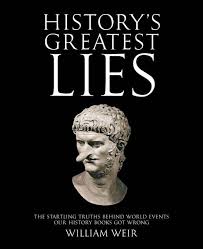Description
“History’s Greatest Lies: The Most Infamous Deceptions in History” by Robert L. Wilkins explores some of history’s most famous misconceptions, myths, and even factual deceptions. The book analyzes how lies have contributed to shaping societies, changing perceptions, and creating misunderstandings in so many fields.
Major Themes and Takeaways:
It discusses historical myths widely accepted in society but turn out either overstated, wrongly interpreted, or even as inventions. For instance, from his book, Wilkins illustrates how some historical happenings may become fixed in people’s minds.
One of the themes prevalent in the book is propaganda influence on history. The chapter indicates ways in which governments and heads of state have manipulated public opinion or justified wars or suppressed dissent through misinformation. This work demonstrates evidence for proper source critique.
Cultural Impact: Such contrived falsehoods that the book is discussing have deeply affected cultures and societies. For instance, the perception of certain activities or intentions of particular historical figures influences the national identities of the countries from where those persons hail, the educational curricula, and international relations in general.
Case Studies: Usually each chapter is dedicated to case studies, such as the stories of how lies become more common knowledge. Examples may include misconceptions about figures such as Christopher Columbus, the Salem witch trials, or fabricated tales that have come to be part of common folklore.
This critical and skeptical attitude towards history, therefore encourages Wilkins as supported by its lies. The result is that the truth behind historical events is sought in lieu of history myths by the reader as propels from the lies.
General Message:
History’s Greatest Lies reminds us that history is not one-dimensional as one might want it to be. This book, written by Robert L. Wilkins, invites the readers to ponder on how historical truth is somewhat complex and how misinformation affects our deep understanding of a particular period in history. It calls for a deeper analysis of history, giving a more nuanced perception of how history is written, remembered, or sometimes distorted.










Reviews
There are no reviews yet.